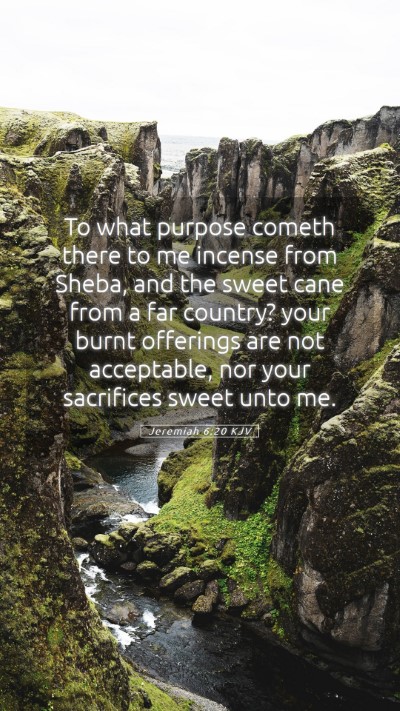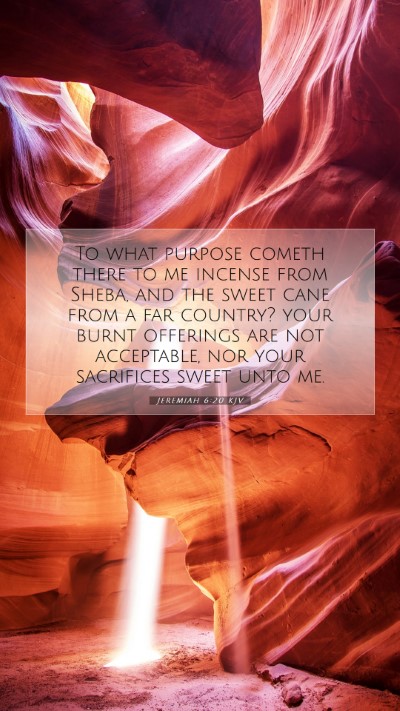Understanding Jeremiah 6:20
Jeremiah 6:20 reads: “To what purpose cometh there to me incense from Sheba, and the sweet cane from a far country? your burnt offerings are not acceptable, nor your sacrifices sweet unto me.” This verse carries a weight of meaning that can be unpacked for deeper understanding in Bible study.
Bible Verse Meanings:
This verse addresses the futile worship practices of the Israelites, highlighting the disconnect between their acts and their hearts. It suggests that God values genuine worship over mere rituals.
Key Themes:
- The futility of empty rituals: The burnt offerings and incense, while culturally significant, are worthless to God when not accompanied by true devotion.
- Divine displeasure: God expresses dissatisfaction not with the acts themselves but with the lack of sincerity behind them.
- Warning against superficial worship: God's call for authentic spirituality is a continuous theme throughout Scripture.
Commentary Insights:
Matthew Henry:
Henry emphasizes that God’s rejection of their offerings signifies a broader rejection of their wayward hearts. He illustrates that even the finest incense cannot mask the sinfulness of the people’s actions, pointing out that true repentance is necessary for God to accept sacrifices.
Albert Barnes:
Barnes notes that the reference to Sheba—a land known for its riches—highlights how attempts to impress God with valuable offerings are misguided when they stem from a lack of righteousness. His interpretation stresses that God desires moral integrity over material gifts.
Adam Clarke:
Clarke discusses the significance behind the “sweet cane,” pointing to the regional practices of using exotic items in worship. His analysis reflects on how God demands genuine faith over any superficial show of religiosity.
Practical Applications:
This passage teaches us that in our own lives, we should reflect on our motivations during worship and prayer. Are we engaging in these acts out of obligation, or do they stem from a sincere desire to connect with God?
Related Bible Cross References:
- Isaiah 1:11-13: Critique of empty sacrifices.
- 1 Samuel 15:22: God prefers obedience over sacrifice.
- Micah 6:6-8: What God requires from us.
Conclusion:
Jeremiah 6:20 urges us to examine our own offerings and worship. Are they pleasing to God, or are they merely rituals devoid of heartfelt commitment? This reminder serves as an essential part of understanding Scripture and applies directly to our daily lives, reinforcing the need for authenticity in our spiritual walks.
Further Study Suggestions:
For those interested in exploring this verse further, consider joining bible study groups or utilizing bible study tools that focus on in-depth bible verse analysis and the historical context of Bible verses.


